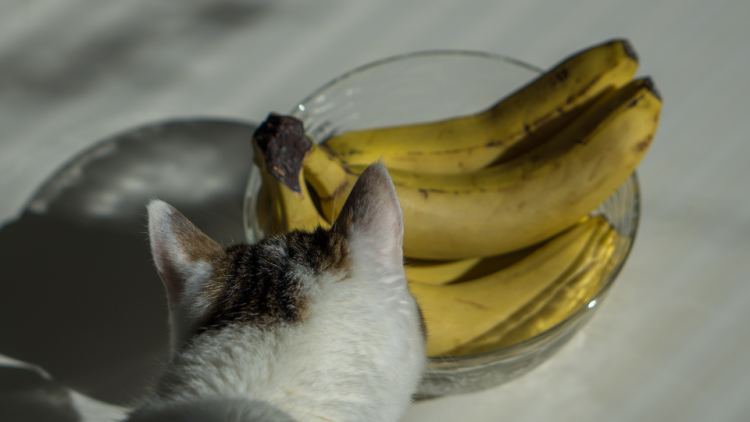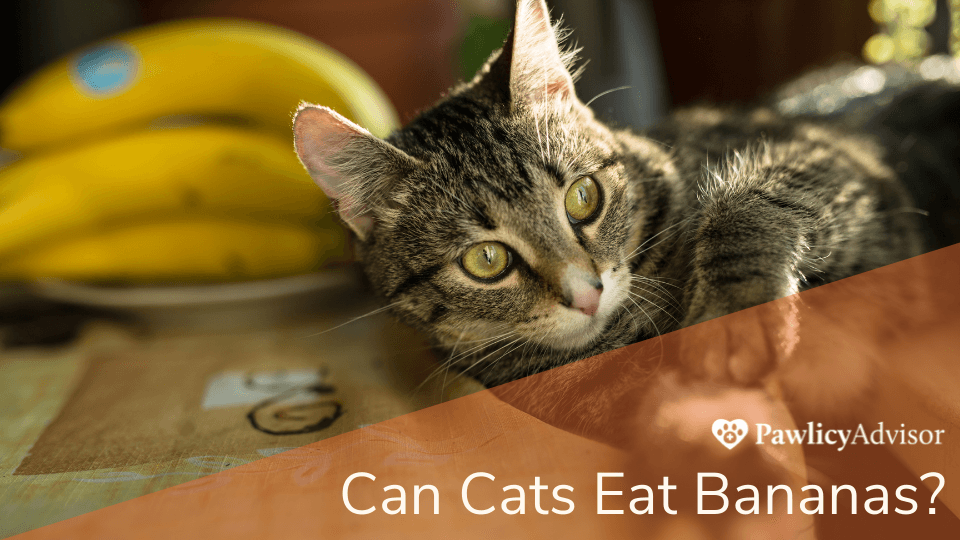We may love to enjoy the sweet and tropical fruit, but can cats eat bananas, too? The short answer is yes, but as with most human foods, there are certain things cat parents need to take into consideration before serving them to their pet.
Keep reading to find out if bananas have any nutritional benefits for cats, how much you can safely offer, and more.
Table of Contents:
- Can cats eat bananas?
- Do cats like bananas?
- When are bananas bad for cats?
- Can kittens eat bananas?
- How to feed a cat bananas
- Can cats eat other fruits?
- Key Takeaways
Pro Tip: Gastrointestinal (GI) issues are among the most common pet insurance claims, with diagnosis and treatment costs ranging from $200 - $8,000. If your cat has pet insurance, you could be reimbursed for up to 100% of that cost, depending on your pet insurance plan.
Can cats eat bananas?
Yes, cats can eat bananas safely because they are non-toxic, but they should only consume the fruit in moderation.
Whether your cat will benefit from eating bananas is a different question. While bananas are incredibly rich in nutrients (such as vitamins, minerals, and fiber) that are beneficial for humans, you should keep in mind that the nutrients your feline friend requires simply are not the same as the ones you need.
As obligate carnivores, cats meet their nutritional needs by consuming other animals (meat). So, the best way to meet these needs is to feed them a complete and balanced diet. If your cat is getting all the required nutrients from their cat food, treats like bananas are not necessary.
Do cats like bananas?
That depends on the individual cat, but considering the fact that felines are notoriously picky eaters, most of them are not as interested in experimenting with new foods as dogs are.
What’s more, many cats are even scared of bananas. You’ve probably seen funny videos where cats get terrified by a harmless banana. Experts explain that this is because most cats dislike the ethyl acetate odor these fruits give away. In fact, rubbing banana peels on furniture can be a great trick to prevent your pet from clawing them. There's also the possibility that the shape of the banana reminds them of a snake and startles them.
When are bananas bad for cats?
Cats are sensitive to strange food. Digesting plant-based foods is a struggle for them, so feeding your feline friend bananas might cause stomach upset.
Bananas have a high carb and sugar content. Cats lack the enzymes required for their digestion, which is why a healthy cat diet should contain no more than 2% sugar or carbohydrate. So, while a slice of banana here and there won’t harm your cat, feeding them bananas frequently or in large amounts can raise blood sugar levels, which can lead to obesity and diabetes.
The most common clinical signs of feline diabetes include constant urination, excessive thirst, lack of appetite, vomiting, and reduced mobility. Contact your vet right away if you notice any of these symptoms and keep your pet's age in mind, as cats are more likely to develop diabetes as they get older.
Bananas also contain high levels of dietary fiber. Cats can’t absorb some of the nutrients from bananas; they will only benefit from the fiber, which can bulk up stool. Fiber is not considered an essential part if a cat’s diet so the added benefits of bananas are limited.
Finally, you should be extra careful because some cats can experience an allergic reaction from eating even a small portion of a banana. According to the Clinical Nutrition Service, even foods that are considered safe (like bananas) can have unexpected reactions. Symptoms of allergic reaction to bananas include itching of the mouth and throat, swelling, itchy rash, wheezing, narrowing of the throat, etc.
If you notice these symptoms or anything else out of the ordinary after serving a banana to your cat, be sure to contact your vet.
Pro Tip: Pet insurance can help pay for allergy testing if your cat is suffering from itchy skin or other issues. Some insurance plans not only reimburse vet-recommended allergy tests but also the complete sick visit.

Can kittens eat bananas?
During the first year of their life, kittens need special nutrition that will support their growth and development. They should consume specially-formulated food which is rich in protein, magnesium, calcium, and other crucial nutrients.
Toward the end of the first 12 months, small treats can be introduced gradually, including bananas. However, it’s always best to consult your veterinarian before introducing new foods into your pet’s diet.
How to safely feed bananas to cats
Taking into consideration your cat’s nutritional needs and the risks associated with banana consumption, here are some tips that will help you safely feed bananas to your feline companion:
- Cut the banana into bite-sized pieces, about the size of cat kibble. You can also mush a small portion into a puree and sprinkle it onto their food. Adding water is also a good idea.
- The peel is inedible, so be sure to remove it before offering the banana to your cat. Not only does it present a choking hazard but it can also cause digestive upset if ingested. Don't feed your cat another fruit right after they’ve eaten a banana and steer clear from rotten bananas as these will just cause tummy upset.
- Pay attention to the quantity that you will feed your cat. Sudden changes in their diet or too much banana can make their stomach upset. A big amount of banana might also be difficult to digest and even cause constipation. Remember, treats should account for no more than 10% of your pet’s daily caloric intake. For instance, if your cat consumes 200 calories per day, only 20 of the calories should come from treats. According to the US Food and Drug Administration, one banana contains about 110 calories. If you are unsure how many calories your feline friend needs, you can always consult your vet.
- Start with a small amount and monitor your pet’s reaction. In most cases, signs of an allergic reaction occur almost immediately after ingestion. If you notice digestive issues like diarrhea or vomiting, call your vet.
- Always consult your vet before introducing new human foods to your cat’s diet.
Can cats eat other fruits?
If you’re having second thoughts about offering your kitty a banana, or they simply dislike the taste, you should consider giving them other cat-safe fruits as a healthy snack. Some of the acceptable fruits for cats are blueberry, strawberry, watermelon, and apples (without the seeds and core).
Some vegetables are also safe for cats, including carrots, spinach, green beans, zucchini, lettuce, and potatoes (without any added salt, seasonings, or butter).
Key Takeaways
- Bananas aren’t toxic to cats, but they contain a lot of sugar, which cats have trouble digesting.
- A piece of banana as an occasional treat will probably not harm your pet, but consuming it on a regular basis can increase their blood sugar levels, causing weight gain and diabetes.
- Too much banana can cause gastrointestinal upset, vomiting, and diarrhea.
- Your cat won’t actually benefit from eating bananas. They’ll be better off if you feed them healthy, meat-based snacks.
- Your vet is in the best position to provide advice on what your feline companion should eat.
